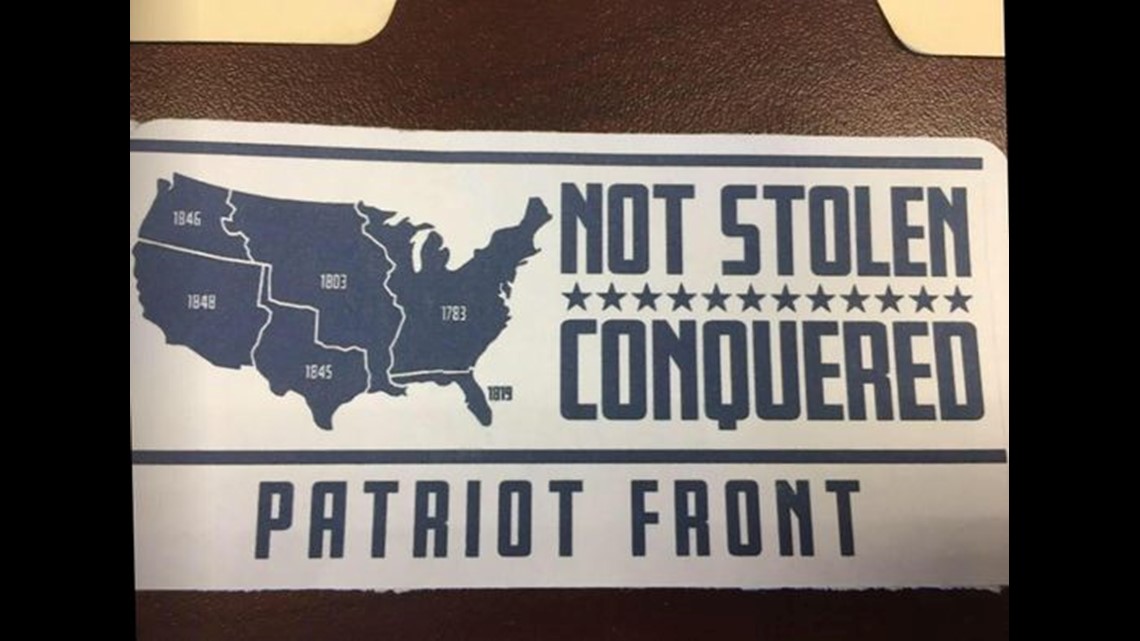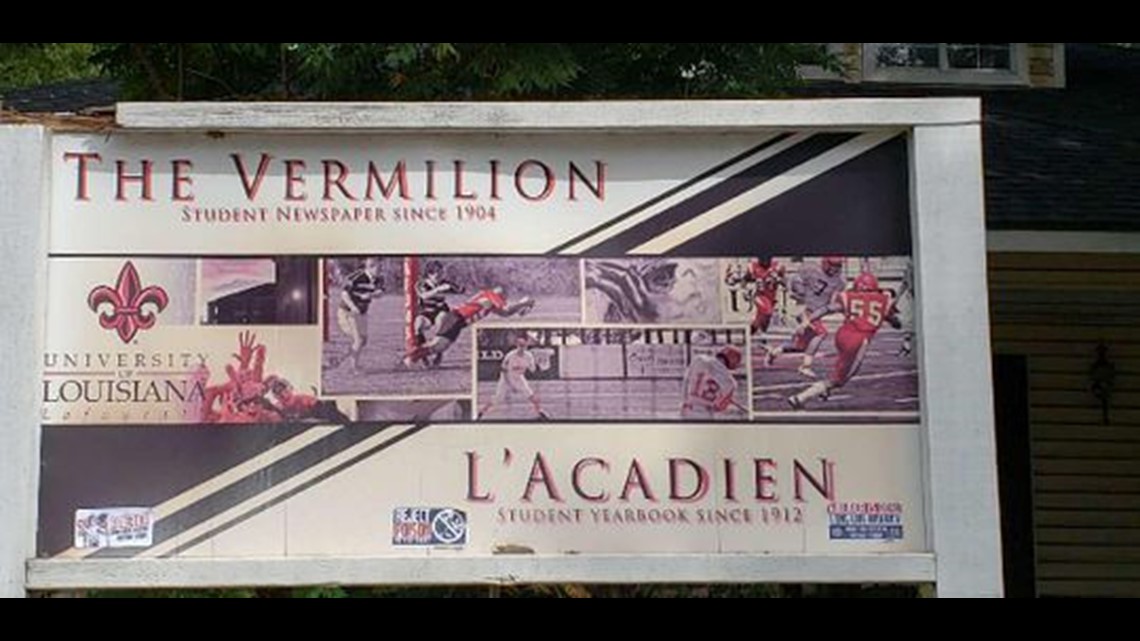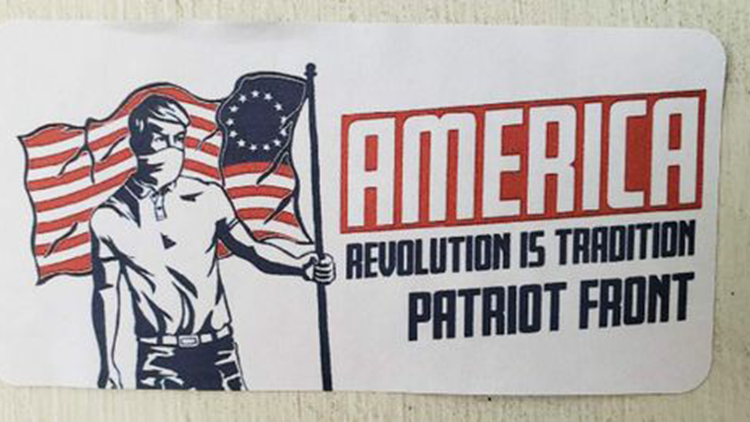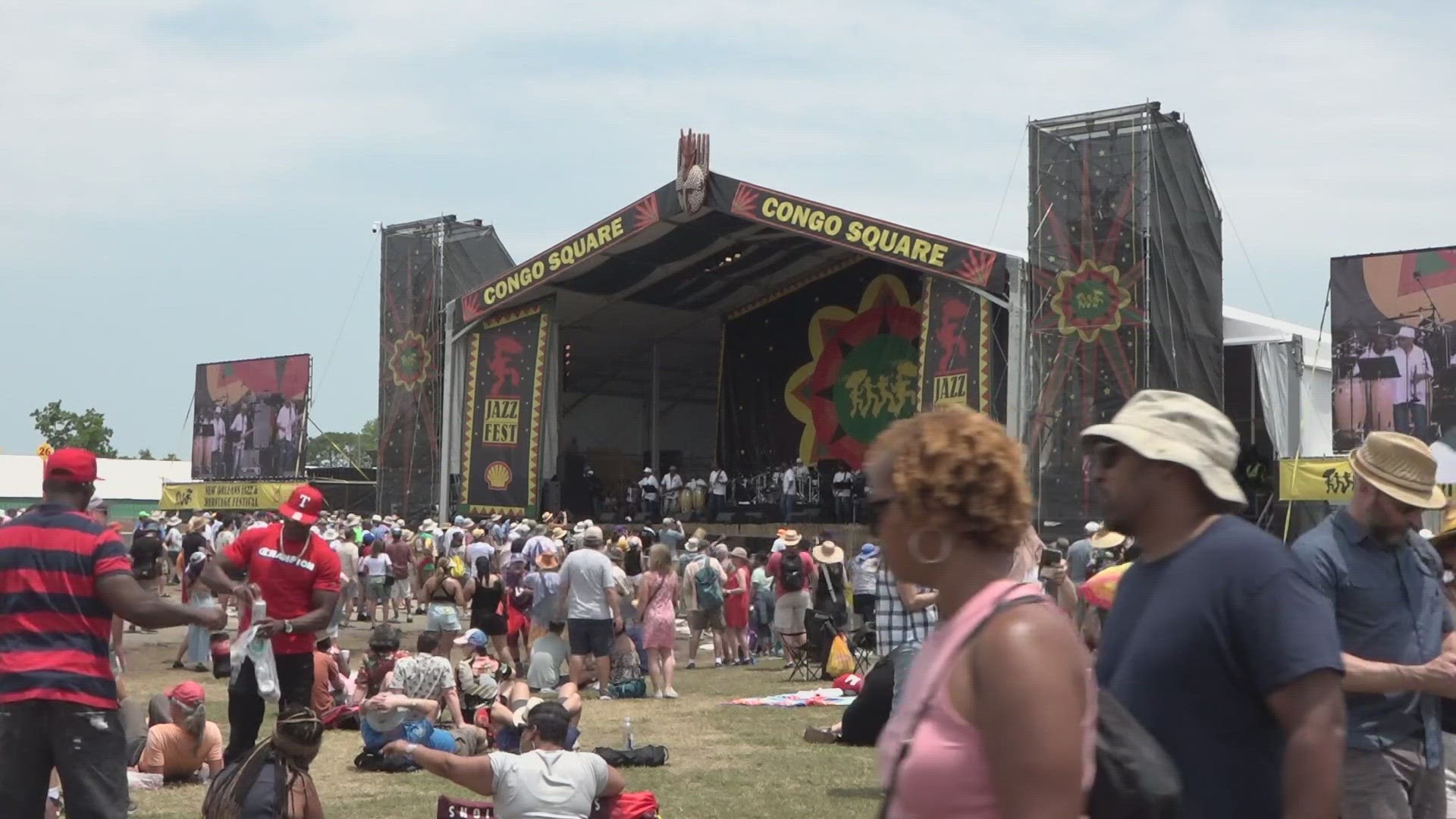They're not using swastikas. You won't see Klan posters.
But white supremacist groups are targeting American college students. They're just getting savvier at messaging.
"While these groups have adjusted their rhetorical strategies, they still fundamentally want a white ethno-state," said Bryan McCann, associate professor of rhetoric and cultural studies at LSU. "... Whatever intellectual veneer they try to use, they are committed to the liquidation of entire groups of people from the U.S. Because that is their ultimate goal, their rhetoric is fundamentally a threat to others."
The flyers and stickers aren't targeting a specific group, and therefore not considered hate crimes by police, but McCann argues they're still dangerous. He's not the only one.
"It may not be criminal, but I don't think anything good will come from it," said Elliot Wade, an African-American junior at the University of Louisiana at Lafayette.
McCann said this rhetoric is dangerous for students, faculty, and staff who belong to vulnerable or minority populations, like Wade.
"Members of underrepresented groups already struggle to feel safe on most college campuses," the LSU professor said.
Plus, there's the risk that messages like this become mainstream or the norm.
"In addition to making other bigoted views seem rational in comparison, there’s also the risk that white nationalist groups themselves become more mainstreamed if we do not scrutinize their rhetoric and understand that what lies under the surface is the same violent ideology that these groups have always embraced," McCann said.
The Anti-Defamation League reported early this year that white supremacist materials increasingly are appearing on college campuses across the country.
"White supremacists are targeting college campuses like never before,” Anti-Defamation League CEO Jonathan Greenblatt said in a news release. "They see campuses as a fertile recruiting ground, as evident by the unprecedented volume of propagandist activity designed to recruit young people to support their vile ideology."
From Sept. 1, 2016 through Jan. 29, 2018, the ADL recorded 346 incidents of white supremacist fliers, stickers, banners and posters appearing on college and university campuses, according to its website.
There was a 258 percent increase from fall 2016 (41 incidents) to fall 2017 (147 incidents).
These "campaigns" targeted 216 college campuses, from Ivy League schools to local community colleges, in 44 states and the District of Columbia.
When the group released its report Feb.1, Louisiana schools had not been on the list.
But stickers from one of the groups highlighted by the Anti-Defamation League made their way to University of Louisiana at Lafayette this spring and summer and to Louisiana State University in early August.
That group, Patriot Front, a Texas-based white supremacist, is among "the most active groups" listed as posting fliers on college campuses across the country, according to ADL. Members maintain that their ancestors conquered America and bequeathed it solely to them.
Patriot Front did not respond to a request for comment on Twitter. The group has a website but no office or contact information.
In March, May and July, stickers bearing messages from the group were found on doors, walls and signs at and around the Lafayette university.
They said things like "Not stolen; conquered" and "Revolution is tradition."
In other words, McCann said, this group and others like it believe that "the U.S. belongs to white people of European descent and making that dream a reality is their primary objective."
"At the core it's the same message," McCann said. "What folks want hasn't changed. They've just adjusted the messaging."
He studies messaging like this, and he can tell you how in recent decades groups have shifted to using more subtle methods.
"That's something hate groups have been aware of for years," McCann said.
Some messages seem harmless enough.
"I think that's where they're getting good at it," McCann said.
Take the group's name, Patriot Front, for example. "Who doesn't like patriotism?" he said.
Another strategy is framing themselves as rebels with language like "revolution."


"Somehow they're defending tradition but also rebels," McCann said. "You can't actually do both, but they make it sound like you can."
That message targets people feeling a little isolated, resentful or reckless, which could describe college students.
"It's that resentment they tap into," McCann said. "[And] what 20-something college student, white male, doesn't want to be rebellious?"
It's a good rhetorical strategy, he said, hovering below many people's radar but still creating a message that people talking about diversity are the status quo that would require shaking up, or revolution.
McCann heard of two other recent incidents at LSU. There was a series of signs that read "It's OK to be white" during fall 2017 and later some materials from Identity Evropa, another well-known, American white supremacist group.
Wade, an English major at UL Lafayette, was a little surprised at first to see the stickers on the Lafayette campus.
"You don't want to think this will be at your university," said Wade, a 20-year-old student from Cecilia.
Wade spoke to The Advertiser after another incident July 2 appeared to target the school's newspaper.
Stickers from the same group were placed on a large sign for The Vermilion,the student-run newspaper, with words like "fake news" and "reject poison."


Wade, whose byline is "The Vermilion's African-American columnist," believes it was retaliation from the same group after he spoke against the fliers in a column last semester and was interviewed in May by a New Orleans TV station.
What has most surprised him is the increase in incidents. He said there were some antagonistic messages written in chalk on campus around the last presidential election. Now it has become more frequent and with more permanent materials.
"I've been surprised by the uptick," Wade said. "People are getting bold. The political climate we're in right now is encouraging this."
The "fake news" and other media-targeted messages came a week after journalists were killed in a shooting in Maryland, which attracted similar "fake news" messaging nationally.
Wade said it's an effort by groups like this to push a "them-versus-us narrative, and it's against reason, logic, factual evidence."
"That's 100 percent dangerous," he said. "When we start ignoring facts is when we get in trouble."
Universities have long been used in this way.
"The far right or white nationalists are not the first ones to center the university as a battleground for the the soul of the country," McCann said.
First of all, "there are a lot of young people at university, a lot of whom are white, so it is potentially a very fertile recruiting ground," he said.
And then the purpose of universities can make students and others uncomfortable as they are intended to foster critical thought on things like identity, power, sexuality and more, he explained.
Some see that as a threat.
"This year LSU has its largest and most diverse freshman class, and we've been very up front about it," McCann said. "(Land grant universities and others) are becoming more diverse spaces. All of that stuff I think scares white nationalist/supremacists."
They want to tap into whatever anxiety these changes are causing.
And they bank on the fact that people who hold racist views usually feel more marginalized in society at large, McCann said.
Wade noticed the fliers in Griffin Hall on March 22. In May he saw fliers up in the Cajundome, around the UL Lafayette bus stop and in Girard Park.
Each time the stickers have been removed by university police, as they were for previous incidents, because they were on school property, Public Information Officer Lt. Billy Abrams said.
Police have surveillance video from the first incident but have not been able to identify the white male from the image, Abrams said. Anyone with information can call the 24-hour dispatch line at 337-482-6447.
"We implore the people to 'see something, say something,' because it's very hard for us as a police department without community involvement," Abrams said. "Campus safety is our job, but it's everybody's responsibility."
Enlisting help from students and faculty is necessary, as university police cannot be everywhere at one time and there are only so many cameras on campus.
"We're steadily adding cameras but every square inch is not covered," Abrams said.
He said many people have just don't want to get involved. Wade thinks he's right.
"There is a huge sense of apathy on campus," the student said.
But Wade wants to see that change on both the student side and in faculty and administration.
"I'd personally just like the university to take a stance," to say it won't be tolerated on campus, which Wade said is necessary "if they want campus to be a safe, inclusive space."
He said it's not about free speech.
"Free speech means that the government isn't going to persecute you for hateful things or misinformation being spread, but that doesn't mean that people around you are not going to hold you accountable," Wade said. "People don't want this in their cities in their towns, and especially not at their university, a place where we're supposed to be above that kind of thinking."
McCann agrees.
"In my view, and I speak as someone who is professionally and personally committed to promoting the virtues of dialogue and debate, such rhetoric is beyond the norms of polite disagreement," McCann said.
"A precondition of authentic deliberation is the presumption that all parties are dignified human beings and are arguing from a place of good faith. White supremacists refuse to do the former and for a member of a marginalized population to do the latter is to accept as reasonable the premise that they are less than human."
He said it's clear from history that groups like these "need to be marginalized themselves and not engaged as reasonable." Referring to the fatal rally in Charlottesville last year, McCann said recent history reveals that they will resort to violence when they feel empowered to do so.
"Granting them any public legitimacy only emboldens them, increases the likelihood that they will be able to recruit members, and makes less conspicuous, but no less harmful forms of bigotry seem reasonable in comparison."
He said "a white nationalist poster on a college campus bulletin board, no matter how coded, is something very different from the internship ads, Greek organization promotions, or even campus political group fliers that surround it."
"It is a threat to entire groups of people and an attempt to build the ranks of those who want to literally eradicate those groups," McCann said.
He also agrees that some are apathetic or ignorant of the campaigns targeting college campuses. That apathy might limit their impact on students.
But rolling your eyes and thinking it's irrelevant might help the white supremacists' "cause," McCann said. It helps keep the messages subtle and reach the people they're targeting.
Abrams said the UL Police Department has a full-time analyst who looks at incidents like this and other crimes on a big-picture scale to examine trends and determine what the end game or purpose might be.
He said these message were determined not to be a threat or hate crimes as the messages didn't target an individual group.
The officer has been with the campus department 20 years and has seen similar incidents before. He describes this as "not new but few and far between."
McCann said groups like this become less powerful when issues are addressed regularly and on a more micro level.
"Confronting inequality and intolerance ... is how we make life more livable for everyone and make it more difficult for them to do their work (recruit or hate)," McCann said.
"I like to say meet good rhetoric for bad causes with better rhetoric for good causes," he said.
Wade is meeting their rhetoric by speaking out, from The Vermilion to Louisiana media.
"I know I make myself a target when I talk about this," he said. "I know I become more visible. But at the same time I must be doing something right if they're retaliating."



